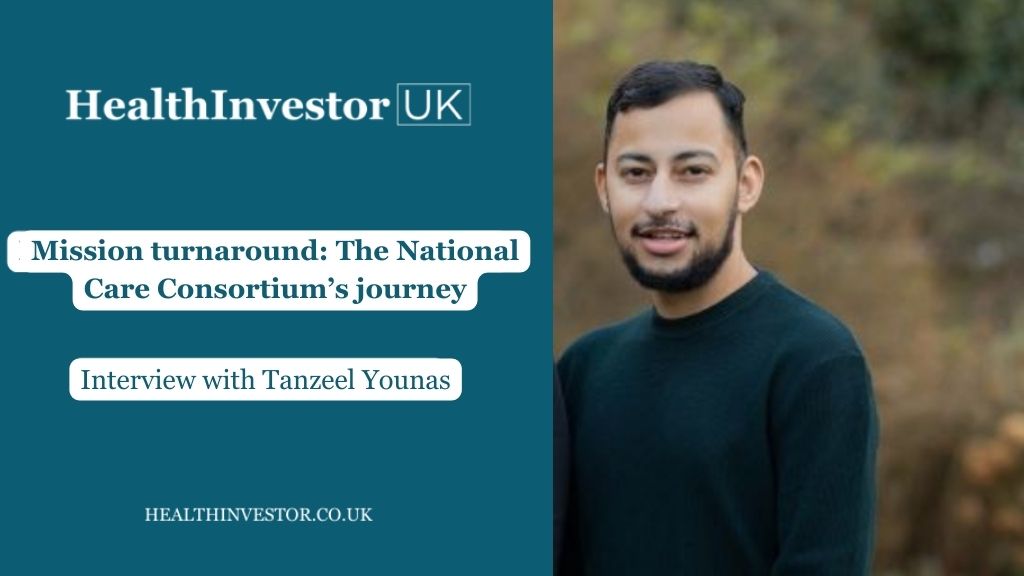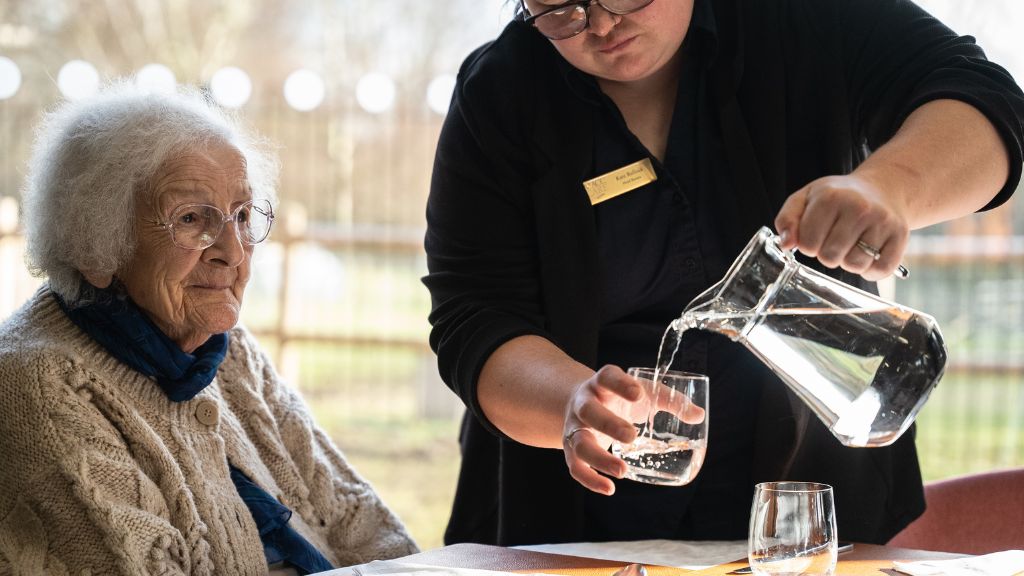Mission turnaround: The National Care Consortium’s journey

The National Care Consortium (NCC) is picking up speed, propelled by its ambitious plans for expansion across the UK. Backed by a recent £10.65 million funding package from HSBC UK, the momentum is building and HealthInvestor sits down with chief executive Tanzeel Younas to explore the ins and outs of this exciting new chapter.
NCC, born out of a family endeavour as the operational vehicle of the Younas Family Group, primarily operates under an M&A turnaround strategy – acquiring and transforming underperforming care homes into thriving, compassionate communities. The group’s journey began in 2016 with the acquisition of a struggling facility. Its success in revitalising it paved the way for further expansion, Younas tells us. Within a year, NCC acquired four more care homes, and the dedication to high-quality care continued to drive growth, with four to six homes being added annually, reaching a total of 40 homes today.
Currently, the scope of NCC encompasses adult social care and assisted living (70%) and children’s services (30%), providing care to individuals from the age of 18 throughout their lives. The group offers a wide array of care services, including residential dementia care, nursing care, mental health support, acquired brain injury care, and learning disability services. The majority of NCC homes (70%) are local authority funded.
2023 “a remarkable milestone”
Reflecting on this year’s performance, Younas says: “We have acquired six Priory homes, two charity homes, two Larchwood Care homes, in addition to three Four Season Home Care homes, with the potential for one more to be added before the year end. This year marks a remarkable milestone as we are on track to acquire a total of 14 homes – our largest number to date. Looking ahead, we are committed to maintaining this momentum over the next 18 months, with plans to add another 10 homes during this period.
“The overall goal is to expand services to 50 adult care homes [2023:40 homes], 100 supported living units [2023: 85 units], and approximately 20 children’s homes [2023: 5 homes],” Younas reveals. “This is an achievable target, and our approach involves maintaining the 30/70 split between adult and children’s services. Both areas are growing independently, with two brothers of the Younas Family Group overseeing adult care and two brothers managing children’s services.”
For Younas, the secret sauce behind this substantial growth lies primarily in the group’s financial management: “We have consistently reinvested our earnings back into the business rather than taking hefty dividends. This approach has allowed us to maintain a low debt-to-asset ratio, demonstrating our commitment to financial sustainability. Our turnaround strategy often involves collaborating with various banks to support different aspects of our operations. Currently, NCC is working in partnership with multiple financial institutions, including HSBC, Barclays, Virgin Bank, Shawbrook, and Unity.”
He further elaborates on his strategic approach to business expansion and synergies creation, which encompasses the establishment of a proprietary tech company, a specialised recruitment agency, and the imminent launch of a consumables business. “This multifaceted strategy represents our commitment to both vertical and horizontal integration. It’s worth noting that a substantial investment of around £1.5 million has been dedicated to the launch of our consumables company. The differentiating factor lies in the unwavering commitment to next-day delivery, serving as a unique selling point.”
Nine to 12 months is all it takes…
Approximately 75% of NCC’s portfolio was acquired while experiencing losses. Younas says: “Even if a home seems suitable for occupancy or agency standards but falls short in terms of Care Quality Commission (CQC), we take it and elevate its standards. Turnaround for us encompasses various aspects —often financial, as some homes are losing money, and occasionally regulatory.
“We make purchases from corporations, like Priory and Four Seasons, or from charities and not-for-profits. The most significant loss we encountered was a home losing £700,000 a year. Within a year, that same home became sustainable, covering its own bills, with no losses. Typically, this transformation occurs within nine to 12 months.
“I get immense satisfaction from witnessing the tangible impact we have on properties. In the past, we acquired a home bleeding £400,000 annually, financially unviable and relying on 500 hours of agency work each week. Today, it accommodates nearly 60 people, operates at almost full capacity, and has even opened a specialised dementia unit. Witnessing such a remarkable turnaround, not only in preserving existing jobs but also creating new opportunities in the local community, is a source of great pride for us.”
Regarding the sector as a whole, he finds it “fantastic”. “It is a vibrant sector and being part of it brings joy. Each day presents unique challenges and opportunities. Waking up, not knowing the problems we’ll face or the opportunities that might arise is invigorating. Personally, I relish spending time in my homes, fostering relationships with residents, staff, and teams alike.
“We are deeply committed to caring for both our staff and residents while continually investing in our homes, and this commitment is at the core of our mission. Employee satisfaction and empowering choices are paramount on our agenda—whether it’s the little things that matter or significant decisions in their workday, such as the choice of the care system they use.”
Identifying targets
As for identifying opportunities and selecting where to invest next, the mantra is simple: “Location, location, location,” says Younas. “We value relationships with local authorities and prefer working with familiar ones. However, we are open to collaborating with new local authorities, maintaining a balance to avoid becoming too widely spread. Our parameters involve staying within a two-and-a-half-hour radius of NCC’s base, Nottingham.”
Speaking of opportunities, Younas observes a positive trend of increased fees in the North, crucial for sustaining local authority-funded care homes. Despite rising costs, recognising the North’s importance is a promising sign, he says adding that the need to keep affordable options available for those unable to afford private fees is paramount.
Any challenges? “Sometimes, despite employing all the right strategies, investing in the building, and being a good owner/employer, it still doesn’t work if the demand in the area is not for that category of care. We’ve faced this scenario before and opted to change the category of care. For instance, we transformed a home from a nursing residential to a specialist acquired brain injury unit. Now, there is a queue of people waiting to get into that home…”
Navigating through regulations and maintaining a positive relationship with the CQC isn’t a hurdle for NCC; it’s an opportunity. Collaborating seamlessly with legal experts, Younas says, the group has turned potential challenges into advantageous partnerships. Starting the growth journey with Dawson Radford Solicitors in Chesterfield and now with Bevan Brittan, he says: “When working with a smaller firm, you’re often a significant client, receiving special treatment. With Bevan Brittan, despite being a larger firm, I still feel like I’m given the special treatment I’ve always received.”
More young people needed in care leadership
“Getting into the care sector today can be tough for young people. The rules, especially compliance with CQC, and the financial aspects make it challenging. The risks are higher now, and the rewards aren’t as good as they were five years ago,” Younas says.
“My vision for the care sector is one of growth and excellence, but achieving this requires embracing technology and being open to change. So, if you’re starting, set a budget, talk to your bank early, and sort out the financial aspects before exploring opportunities. The importance of location cannot be overstated. It’s not just about buying a care home; it’s about proximity and involvement. Choose the right location, then look for care homes there. And my tip for beginners: go for a residential dementia care home. It’s a simpler start…”
For Younas, fostering a thriving care sector requires encouraging a forward-thinking approach and empowering the next generation to shape the future of caregiving.
Looking ahead, he has his sights set on a £100 million turnover business by 2025, aiming for a 20% boost from the NCC’s current turnover.




